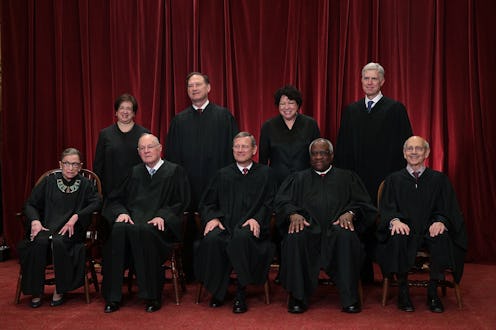News
How The Supreme Court Hurt #MeToo With Its Latest Ruling

The #MeToo movement has seen women coming out in droves, telling the world about the sexual harassment and assault that they've survived at the hands of strangers, lovers, and coworkers. Despite the still-ongoing momentum that #MeToo created, though, Justice Neil Gorsuch's first Supreme Court decision hurt the #MeToo movement — and it's serious.
The case on the table was Epic Systems Corp v. Lewis, and it had to do with whether companies could force employees to sign contracts that waived their right to file class-action lawsuits. Contracts like that force employees to take any issues that they have into individual arbitration, the Huff Post explained, a situation that is generally tilted in favor of the company rather than the individual.
In her dissent of the majority decision, Justice Ruth Bader Ginsberg explained how this is a huge financial burden for individual workers, who cannot always handle the court costs they would incur. However, many commentators discussing the case after the decisions came out have noted that it's just as problematic for survivors of sexual harassment hoping to get some restitution for what they suffered through.
Much of what #MeToo's power rested on, the Huff Post noted, was the fact that women were banding together to report the sexual misbehavior and create real change, rather than just going into individual arbitration and coming out with a single settlement.
Buzzfeed explained that this doesn't only make it more difficult for the women bound by these contracts to come forward — it also allows the companies to move forward without changing any of their policies.
Think, for example, of the situation at Fox, with former anchor Bill O'Reilly. O'Reilly settled with six women over complaints of sexual harassment and verbal abuse, the New York Times reported in April (O'Reilly has denied all allegations of sexual harassment). The Times reported that the terms of the women's settlement included clauses binding them to secrecy, which meant that Fox was in no way forced to change, or even investigate, what was going on. It was only once reports emerged that multiple women had accused O'Reilly of sexual harassment that Fox fired O'Reilly, saying the company had done a "thorough and careful review of the allegations."
This Supreme Court decision affirms the right of companies to force their employees into arbitration that maintains the status quo. As The Cut explained, even women who had all suffered the same abuse from the same person would not be able to bring a lawsuit against that person collectively.
The San Francisco Chronicle explained the arguments in favor of arbitration, which include flexibility for both sides, speed, and a cheaper resolution outside of a public courtroom. Gorsuch's decision included these reasons, with him saying that "the virtues Congress originally saw in arbitration, its speed and simplicity and inexpensiveness, would be shorn away and arbitration would wind up looking like the litigation it was meant to displace" if workers were universally allowed to file claims together.
However, those things aren't what the #MeToo movement is concerned with. #MeToo doesn't just need publicity to thrive; its very explosiveness and power came from how public it finally allowed women to be. The speed or cost of the court case is unimportant for #MeToo; what's more important is forcing companies to change any culture of sexual harassment and violence violence.
Instead of elevating the rights workers potentially suffering through sexual harassment in the workplace, the Huff Post reported that this decision elevated the rights of companies to bury the workers' complaints in secret — or, in some cases, to prevent them from making those complaints at all.